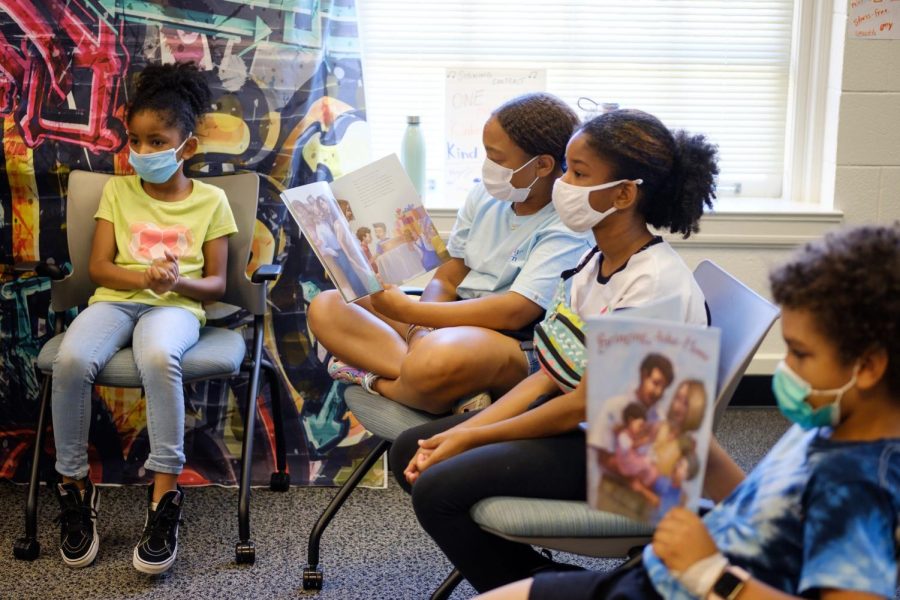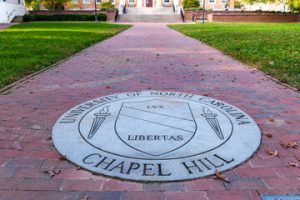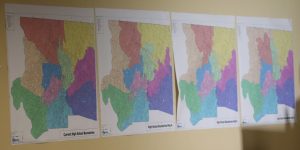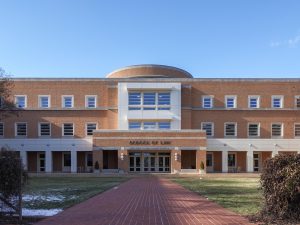Wake Forest hosts Freedom School
The program will run from June 20 to July 27 and will serve 75 students
Students participate in a reading activity in the 2021 iteration of freedom school.
July 13, 2022
From June 20 to July 27, Wake Forest will host a Freedom School, a free six-week literacy-based summer program that strives to enhance children’s reading skills and close achievement gaps. The Wake Forest Freedom School is a part of a national initiative developed by the Children’s Defense Fund (CDF) and will serve 75 students in kindergarten through eighth grade.
Freedom Schools can be traced back to the Civil Rights era and were originally founded by the Student Nonviolent Coordinating Committee (SNCC). Currently, freedom schools are operated as part of the CDF’s Black Community Crusade for Children. According to the CDF, the Freedom School program provides academic enrichment to over 7,200 children and youth every year, the vast majority of whom are Black.
Students from Wake Forest and other nearby universities served as volunteer teachers and organizers. Volunteers are tasked with immersing children in the fun of reading through song and dance. Many of them are driven by their passion to help marginalized youth.
“I chose to participate in Freedom School because of a course that I took with Dr. Shannon Brady that discussed the psychology of inequality,” sophomore Rachael Nyankson, servant leader intern at the Wake Forest Freedom School, said. “We talked about educational disparities that many marginalized children in America face, and I related to so many. When I heard about Freedom School and its fun, nontraditional approach to education, I was sold.”
During Freedom School, students begin their day by gathering in the Winston Hall auditorium for “Harambee” — an opening forum featuring inspirational cheers and chants. The songs and reading highlight the theme “I can make a difference”. Freedom School’s curriculum and programming teach students to not only recognize the societal issues in their daily life but also how they can contribute to making the world a better place.
Reverend Dr. Starsky Wilson, president of the Children’s Defense Fund, was invited to Harambee as a guest speaker on June 30. He read “For Beautiful Black Boys Who Believe in a Better World” by Michael W. Waters, a picture book narrating one Black family’s response to racism and gun violence.
“The only moral authority we have in a pluralistic world is that we begin our work with the pain, the problems and the challenges of proximity to the children,” Wilson said. “We will continue to do this work so that we can make sure we have integrated our policy work with our program because this is the only way we get to the vision of a nation where marginalized children flourish.”
After Harambee, children depart to different classrooms for their integrated reading session. The contents of the curriculum are selected by nationwide specialists with the main focus on social advocacy, self-esteem and dreams.
This year, however, the program also expands to STEM fields. STEM-focused lessons are incorporated into the courses twice a week to give children an early introduction to various opportunities in the STEM field.
Nyankson highlights the importance of exposing children to science at an early age.
“My love for STEM did not start until much later, and I definitely wished it would’ve started sooner,” Nyankson said. “STEM is super broad — the possibilities are endless.”
Dr. Danielle Parker Moore, executive director of the Wake Forest Freedom School and assistant professor of education, agrees that engaging children in STEM knowledge and skills is a critical part of the program. She also points out that the STEM curriculum ensures the children an enjoyable learning experience.
“We have some separate books that cover science,” Moore said. “We also have a lot of video-based curriculum on careers, hoping that it will expose kids to STEM careers.”
Aside from academics, the program also enables young scholars to interact with their peers and college-aged students. During Harambee, they appreciate their friends by singing a “you are great” song and dancing with their teachers on stage whenever the music starts.
Nyankson believes working at the Freedom School has given her a newfound appreciation for educators. For her, participating in Freedom School is an essential part of the larger educational reform she envisions.
“The most rewarding experience is when my scholars enjoy the activity that I lead for that day,” Nyankson said. “Hearing ‘I love Miss Rachael’s class’ warms my heart. The fact that people, children and adults who are so different from one another can all put aside their differences to come together for Freedom School is something special.”
Like other civic engagement programs, Freedom School not only offers children an opportunity to be engaged intellectually, but it also allows many Wake Forest students to be involved in serving the Winston-Salem community.
“The Freedom School program is an incredible program that allows Wake Forest to leverage valuable resources for community impact,” Camry Wilborn, project director and site coordinator of the Wake Forest Freedom School, said. “In addition to fulfilling all of the outcomes set by the Children’s Defense Fund, we can also give kids in our community access to a campus that many have never been on. This allows them to dream about college and then apply themselves to achieve it.”














